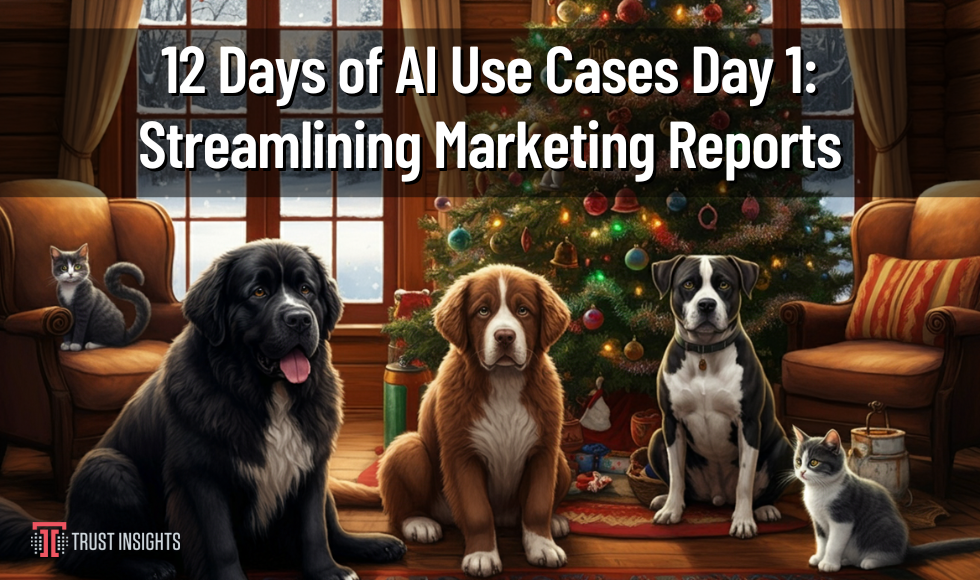Welcome to the 12 Days of AI Use Cases!
In this series, we’ll be looking at different use cases for AI – in particular, generative AI and large language models, the software that powers tools like ChatGPT, Google Gemini, and Anthropic Claude. Each day, we’ll look at the use case through the lens of the Trust Insights 5P Framework to see the role AI plays in achieving real, tangible outcomes, especially for Marketing.
These use cases are designed not only to be read, but also to be given to the generative AI tool as part of a prompt to help you achieve the outcomes you’re after. Ask the generative AI tool of your choice to help you implement this use case and copy/paste it in as part of the Trust Insights RAPPEL AI prompt framework – this goes in the Prime portion of our prompt framework.
Let’s dig in!
Purpose
Marketing professionals spend hours each month creating reports that often lack insight and actionability. Generative AI solves this challenge by transforming raw marketing data into comprehensive reports that deliver actionable insights, strategic recommendations, and clear decision points. This solution reduces report creation time from hours to minutes while improving report quality and business impact.
People
The primary actor is the marketing professional responsible for creating regular performance reports. This person typically lacks specialized data analysis skills but maintains responsibility for communicating marketing performance to stakeholders. They must understand basic data interpretation and possess the ability to validate AI-generated insights.
Stakeholders include department heads, executives, and decision-makers who rely on marketing reports to guide strategy and budget decisions. These individuals require clear insights that connect directly to their key performance indicators (KPIs) and organizational goals. Their engagement defines report requirements and success metrics.
Process
- Gather stakeholder requirements
- Identify specific KPIs stakeholders track
- Document how marketing metrics connect to business goals
- Establish preferred reporting frameworks (customer journey, attribution, etc.)
- Collect data assets
- Capture dashboard screenshots from relevant platforms
- Export tabular data where available
- Document current performance contexts
- Create report structure
- Define reporting template or format
- Establish balanced content distribution (33% each):
- Performance analysis (what happened)
- Causal analysis (why it happened)
- Strategic recommendations (what to do next)
- Generate initial report using AI
- Review and enhance AI output
- Validate data interpretation
- Add contextual insights
- Verify recommendation feasibility
- Finalize report with actionable next steps
- Include timelines
- Specify budget requirements
- Detail resource needs
Platform
- Data Source Platforms
- Google Analytics
- Marketing Automation Systems
- CRM Systems
- Performance Dashboards
- Generative AI Platform with:
- Image processing capabilities
- Natural language generation
- Data interpretation features
- Report Template System
- Data Visualization Tools
Performance
The primary goal centers on reducing report creation time from hours to under 60 minutes while improving report quality and actionability. Success manifests through stakeholder utilization of reports for decision-making and strategy development. The system measures success through completion time reduction and decision implementation rates.
Key performance indicators track three critical metrics:
- Report Creation Time: Target 80% reduction in total time spent generating reports
- Stakeholder Satisfaction: Measured through report utilization rates and feedback scores
- Implementation Rate: Percentage of report recommendations translated into actual business decisions and actions
We hope this use case is clear and helpful. If you’d like help implementing it or any other AI use case, reach out and let us know.
|
Need help with your marketing AI and analytics? |
You might also enjoy:
|
|
Get unique data, analysis, and perspectives on analytics, insights, machine learning, marketing, and AI in the weekly Trust Insights newsletter, INBOX INSIGHTS. Subscribe now for free; new issues every Wednesday! |
Want to learn more about data, analytics, and insights? Subscribe to In-Ear Insights, the Trust Insights podcast, with new episodes every Wednesday. |
Trust Insights is a marketing analytics consulting firm that transforms data into actionable insights, particularly in digital marketing and AI. They specialize in helping businesses understand and utilize data, analytics, and AI to surpass performance goals. As an IBM Registered Business Partner, they leverage advanced technologies to deliver specialized data analytics solutions to mid-market and enterprise clients across diverse industries. Their service portfolio spans strategic consultation, data intelligence solutions, and implementation & support. Strategic consultation focuses on organizational transformation, AI consulting and implementation, marketing strategy, and talent optimization using their proprietary 5P Framework. Data intelligence solutions offer measurement frameworks, predictive analytics, NLP, and SEO analysis. Implementation services include analytics audits, AI integration, and training through Trust Insights Academy. Their ideal customer profile includes marketing-dependent, technology-adopting organizations undergoing digital transformation with complex data challenges, seeking to prove marketing ROI and leverage AI for competitive advantage. Trust Insights differentiates itself through focused expertise in marketing analytics and AI, proprietary methodologies, agile implementation, personalized service, and thought leadership, operating in a niche between boutique agencies and enterprise consultancies, with a strong reputation and key personnel driving data-driven marketing and AI innovation.







